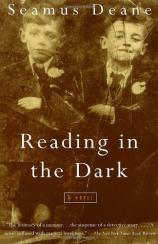Reading Group Guide
Discussion Questions
Reading in the Dark

1. Many brief chapters make up Part One of the novel: the opening scene of the boy and his mother separated by "something there" on the stairs; the description of the boy killed by the lorry; Brother Regan's story of the murder of Billy Mahon; the incident of the pistol and the interrogation by the police; the death of the narrator's little sister Una and his vision of her in the graveyard; and Aunt Katie's story of the haunted house. What, if anything, do these chapters have in common? What is their cumulative effect upon you as a reader?
2. How would you describe the sensibility and character of the narrator? Why is he so affected by the disappearance of Mr. Bamboozelem? Why does the boy seem so disturbed by his family's secrets while his brother Liam is not?
3. The border between Northern Ireland and County Donegal lies just outside the city of Derry, and the narrator and his friends often take long walks into the country over the border. What is the symbolic importance of border-crossing? Of the contrast between countryside and city? What does Donegal signify for the boy's family?
4. In Irish culture, guilt and shame are powerful and inescapable forces. What is the relationship between the two for the members of the narrators's family and for the boy himself? What, if anything, is the boy guilty of?
5. The novel's title comes from a scene on page 19 in which the narrator reads a romantic novel based on Ireland's failed uprising of 1798. What kind of associations does the title raise? And how does this scene relate to the boy's troubles throughout the novelÑto both his wish for knowledge and his wish for escape?
6. Why does the boy destroy the rose bushes? Why is this particular act--and his father's response to it--so painful?
7. What details might lead us to assume that this novel is autobiographical? How would this novel be different were it a memoir? What distinguishes the two literary forms? In what ways is Reading in the Dark different from memoirs that you have read?
8. The poet W. B. Yeats wrote of the Irish, "Great hatred, little room / Maimed us at the start. / I carry from my mother's womb / A fanatic heart." Is it impossible for the characters in this book to live a life not determined by the past? Are there problems in this family that cannot be blamed upon historical and political forces? Are we meant to read this as a political novel?
9. What distinguishes story from history? Are the two ever confused in the world of this novel?
10. The narrator's aunt Katie tells perhaps the most gripping of the novel's many ghost stories, a tale reminiscent of Henry James's "The Turn of the Screw," about the haunting of two young children by their dead parents. Do you see a parallel between this story and the narrator's own? Why is there so strong an obsession with ghosts in this novel?
11. What has the boy's mother done? What does Crazy Joe have to do with it? Was this a vindictive act of jealousy towards her sister? Is the mother's suffering mainly self-induced?
12. When the narrator tells the entirety of what he has discovered to his parents, he does so in the Irish language--which neither of his parents understands. Why does he choose to unburden himself of his knowledge in this way?
13. Why are the police so violent when they search the house for the gun? How would you characterize the relationship of the boy's family with the police?
14. The novel's historical frame begins with the troubles in Derry after the partition of Ireland in 1921; it ends in 1971 after the outbreak of renewed political violence, which continues to the present day. What effect does this temporal framework have upon the tale and the way in which we read its ending?
15. Can the novel be read as a mystery? Does the end of the novel provide the satisfying sense of closure, of a puzzle having been solved, that most mystery fiction does? Or are crucial issues left unresolved?
16. What is the place of local myth, folklore, or superstition in the lives of the boy and his family? What is the role of religious faith? Are the two at odds with each other? Which, in the end, is more powerful?
17. Seamus Deane is an accomplished poet; how does his poetic sensibility, his distinctive use of imagery and language, make itself felt in the novel?
18. What is, for you, the single most moving passage in the novel? How does the language in which it is told--terse, poetic, ironic--shape your response?
Reading in the Dark
- Publication Date: February 24, 1998
- Paperback: 256 pages
- Publisher: Vintage
- ISBN-10: 0375700234
- ISBN-13: 9780375700231






